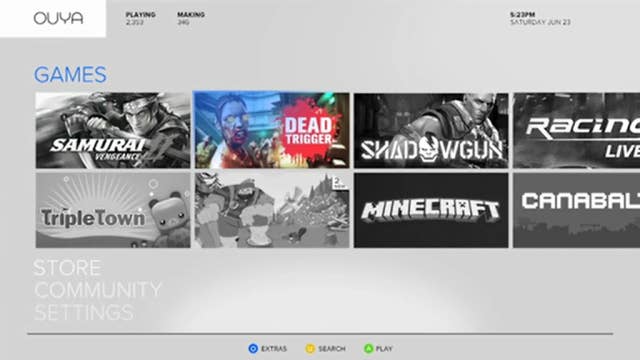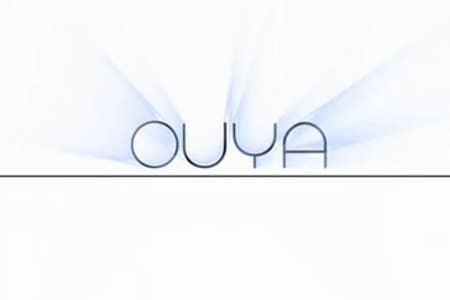Ouya: Panacea For Console Biz or The Next Phantom?
Veteran journalist Chris Morris tackles the major reasons why Ouya could be a revolution or a mere footnote
Any time a start-up makes $4.5 million in four days through crowdsourcing, it's bound to raise a few eyebrows. And Ouya has certainly done that.
Enthusiasts are dreaming of a dark horse console that will bring gaming back to its roots, ending the cycle of sequel-itis and injecting some fresh new game mechanics into the industry. Skeptics, meanwhile, say those Kickstarter supporters could be throwing their money away on a product that will never find a significant audience.
Ironically, they could both be right.
Ouya will be a case study in marketing and PR in the years to come. The campaign has been orchestrated to perfection, with opinion maker- and mass media coverage of the system hitting the day the Kickstarter launched. It preached to the choir on Reddit. And it had a number of respected industry names lending their support (though some a bit less enthusiastically than it initially appeared).
It's a system that currently straddles the lines of potential greatness and historical footnote. And which way it will go is anyone's guess. Here are a few arguments for both sides:
Why Ouya could work
Magical price point: Price matters - especially when it comes to gaming systems. (Don't believe me? Ask Nintendo to tell you the story of the 3DS.) And when it comes to the sweet spot with consumers, you can't do much better than $99.
"Wii U hasn't energized the base yet... Ouya's plans to launch in the first quarter of 2013 give it a pretty clear field for at least six months"
Sub-$100 is a level where the mainstream is willing to take a chance, even if a system is unproven. If Ouya can hit its goal of a $99 console - especially one with a robust series of offerings (including the standard Netflix, Hulu, etc. applications), it could rope in people from the mainstream world, which would go a long way to achieving sustainability.
Indie love: Independent game makers rarely seek the spotlight, but that doesn't mean they don't want their work to be recognized. Ouya might be a perfect showcase for their games - and there's a growing contingent of gamers who are eager to check those titles out.
Indie games are typically niche products - and would never stand a chance when pitted against major franchises. There have, of course, been exceptions (and Ouya's eager to get them on board), but you don't have to look too far beyond Xbox Live sales numbers to see that most smaller games don't make a mint.

Ouya could bring smaller developers together with core fans who want to try something a bit out there. And the word of mouth that generates from the ones that connect could widen the system's install base.
Hardware drought: Gamers are ready for new hardware. The Xbox 360 and PlayStation 3 are still putting out good games, but they're both long in the tooth. And the Wii U hasn't energized the base yet.
Ouya's plans to launch in the first quarter of 2013 give it a pretty clear field for at least six months. People who aren't interested in a Wii U or don't want to pay its initial price could be lured over to Ouya and help the system steady its legs.
Mobile gaming malaise: Mobile gaming is certainly convenient. And there are more than a few standout games that are addictive as anything console companies are putting out - arguably more so. But it lacks a sense of awe.
Ouya's chief argument for its existence is a good one. Games are more fun on a big scale - and the TV is a natural spot for them. TV manufacturers know this, which is why Samsung recently added Angry Birds to its app offerings and why OnLive is being bundled with some sets. Android games haven't had a chance to explore the big screen yet - and there are several that could shine there, given the chance.
Gamers love the underdog: Core gamers are reliable in their disdain for the corporate machine. For years EA was the evil empire (well, until they'd put out a game that looked cool). Today it's Activision. Ouya is a bit player on this large stage and it has won the hearts of that crowd.
The problem is: If Ouya does get too big, that love could turn to opposition down the road - but seeing as that would mean the company is taking in hundreds of millions of dollars, that's a problem Ouya would likely enjoy figuring out.
Why Ouya could fail
Questionable sustainable interest: It's easy to bask in the spotlight when you're taking in millions of dollars in crowdfunding. Ouya's on track to break Kickstarter fundraising records. But once it truly goes toe-to-toe with the big consoles, it's going to have a harder fight.
It's easy to support something in theory, but when a player's choices are between a port of an Android game and a new God of War, most are going to follow Kratos. And don't forget a new Grand Theft Auto should be hitting shelves early next year as well.
"To date, no home console has succeeded without the notable support of [major third-party] publishers"
Too many choices: There are a ton of games in the Android app store - but finding what you want is something of a nightmare. One of Apple's big advantages is an easy to navigate user interface - and discoverability for key titles.
Ouya isn't the Android marketplace, but if it doesn't get its online store perfect out of the gate, it could stumble quickly - and be relegated to the pile of console corpses in people's closets.
Marketing wars: By so vastly exceeding its Kickstarter target, Ouya has a little money to play around with. But even if it dedicates all of that to marketing its system, that money is going to pale in comparison to what the big three throw at theirs.
More importantly, most game makers for the system won't have any marketing budget to speak of. And while word of mouth can be a very effective way to create a hit title, it's not something that can be relied upon (or forced). Good games and good developers are certain to be drowned out by other (sometimes crappy) titles for the big systems.
No major publisher support: Part of its underdog role means Ouya isn't likely to actively lobby companies like EA, Ubisoft and Activision to build games for its system. Even if they did, though, it would likely be a waste of time.
"Now that the money is there, the Ouya needs to stop being a 'tell me' story - and start being a 'show me' one"
Major third-party publishers may support Ouya insofar as they'll consider ports of any Android games they create, once the system gets some sort of decent installed base. But given how unlikely it is that Ouya will achieve a distribution as wide as the major consoles - and the company's inability to provide a level of support like Microsoft, Sony and Nintendo - don't expect AAA games to be part of the lineup.
To date, no home console has succeeded without the notable support of those publishers. The market is certainly different, but Ouya's odds of beating that trend are low.
The vaporware issue: For all the talk about Ouya, the system doesn't exist. There are prototypes, but there are still a lot of holes (including the lack of a finished controller). The company has been precise with details, which lends a lot of confidence, but despite the showering of cash and gamer love, there's still the chance that the system could never materialize. Remember: Even the Phantom seemed real (if ludicrous) for a short while.
The coming months are critical to Ouya. If it wants to keep the love - and convince people that it actually will make it to market, it will need to provide regular updates - and get the system in front of the media for trials.
Now that the money is there, the Ouya needs to stop being a "tell me" story - and start being a "show me" one.

